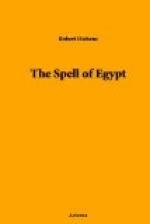Meanwhile, instead of the little island that I knew, and thought a little paradise breathing out enchantment in the midst of titanic sterility, I found a something diseased. Philae now, when out of the water, as it was all the time when I was last in Egypt, looks like a thing stricken with some creeping malady—one of those maladies which begin in the lower members of a body, and work their way gradually but inexorably upward to the trunk, until they attain the heart.
I came to it by the desert, and descended to Shellal—Shellal with its railway-station, its workmen’s buildings, its tents, its dozens of screens to protect the hewers of stone from the burning rays of the sun, its bustle of people, of overseers, engineers, and workmen, Egyptian, Nubian, Italian, and Greek. The silence I had known was gone, though the desert lay all around—the great sands, the great masses of granite that look as if patiently waiting to be fashioned into obelisks, and sarcophagi, and statues. But away there across the bend of the river, dominating the ugly rummage of this intrusive beehive of human bees, sheer grace overcoming strength both of nature and human nature, rose the fabled “Pharaoh’s Bed”; gracious, tender, from Shellal most delicately perfect, and glowing with pale gold against the grim background of the hills on the western shore. It seemed to plead for mercy, like something feminine threatened with outrage, to protest through its mere beauty, as a woman might protest by an attitude, against further desecration.
And in the distance the Nile roared through the many gates of the dam, making answer to the protest.
What irony was in this scene! In the old days of Egypt Philae was sacred ground, was the Nile-protected home of sacerdotal mysteries, was a veritable Mecca to the believers in Osiris, to which it was forbidden even to draw near without permission. The ancient Egyptians swore solemnly “By him who sleeps in Philae.” Now they sometimes swear angrily at him who wakes in, or at least by, Philae, and keeps them steadily going at their appointed tasks. And instead of it being forbidden to draw near to a sacred spot, needy men from foreign countries flock thither in eager crowds, not to worship in beauty, but to earn a living wage.
And “Pharaoh’s Bed” looks out over the water and seems to wonder what will be the end.
I was glad to escape from Shellal, pursued by the shriek of an engine announcing its departure from the station, glad to be on the quiet water, to put it between me and that crowd of busy workers. Before me I saw a vast lake, not unlovely, where once the Nile flowed swiftly, far off a grey smudge—the very damnable dam. All around me was a grim and cruel world of rocks, and of hills that look almost like heaps of rubbish, some of them grey, some of them in color so dark that they resemble the lava torrents petrified near Catania, or the “Black Country” in England through which one rushes on one’s way to the north. Just here and there, sweetly almost as the pink blossoms of the wild oleander, which I have seen from Sicilian seas lifting their heads from the crevices of sea rocks, the amber and rosy sands of Nubia smiled down over grit, stone, and granite.




